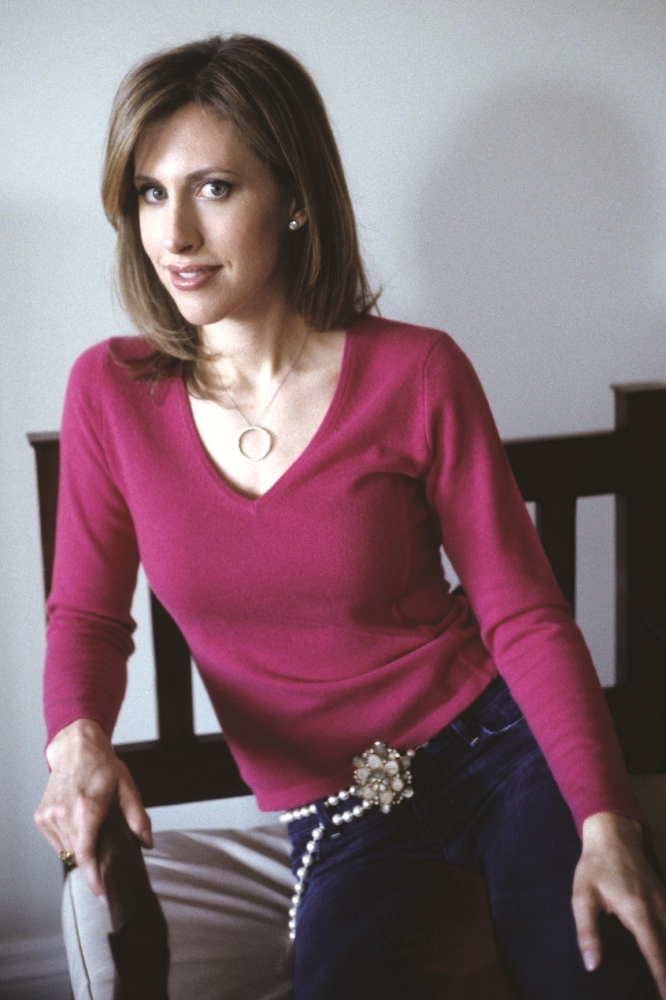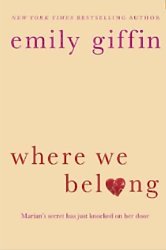
Emily Giffin

Where We Belong is written from two perspectives—the chapters alternating between a woman who gave her baby up for adoption (Marian) and the eighteen-year old daughter (Kirby) now looking for her birth mother. I especially loved writing the voice of a teenager as I’ve always been drawn to coming of age stories.
At its heart, the book is about secrets and what happens to us and those closest to us when we keep them. I’ve always been intrigued by the power of secrets. Is it ever justifiable to keep them from the ones we love? And does keeping them irrevocably change who we are? Adoption, as a premise, seemed a great way to explore some of those broader themes. There are so many perspectives to explore—such rich, emotional terrain.
You have said that you had a passion for writing at a young age. So what made you go to law school?
I’m not sure exactly what happened during college, as I never lost my desire to become a writer. But looking back, I think I had the sense that I had to get a “real” job first—that I couldn’t graduate and promptly sit down to write a novel. I took a lot of history and political science classes—so law school became a logical next stop. If I’m completely honest, I also think I went to school because it felt safer—a more certain path to measurable success. I think it always feels riskier and scarier to go after something you really love and want because the rejection and failure hurts more.
You studied Law at the University of Virginia School of Law and practiced for many years so what made you leave that behind for writing?
While I loved my time in law school, I absolutely loathed practicing as an attorney, at least in the big firm culture I found myself. As it turns out, professional misery can be quite motivating! So very early on, I devised a plan to pay off my law school loans so that I could try to write full-time without the noose of debt. Meanwhile, I began writing a young adult novel in my free time (and sometimes while at work!). Four years later, my loans were paid off and my book was completed. I was able to land an agent, but over the next several months, I received a dozen rejection letters from publishers. I seriously contemplated giving up and keeping my nose to the legal grindstone, but instead, I quit my job, moved to London and decided to try again. It was then and there that I began writing SOMETHING BORROWED, and I haven’t looked back since (though I did maintain my license to practice for many years, just in case)!
After giving up the law, what made you choose London? What was it like for you living in London?
My mother has always been an Anglophile and taught my sister and me to love British history and literature. Growing up, we both dreamed of living in London. My sister lived there right after college—and I went right after 9/11 when I left the law. Leaving my law firm job was the riskiest thing I have ever done, but it was also, without question, one of the richest experiences of my life. I absolutely love London and was so inspired by the city. It is now such a sentimental place, too, as I wrote my first two novels while living there, got married and engaged during my time there, and was pregnant with my twin sons Edward and George before returning to the States. My boys are turning ten on December 31st and we are returning to celebrate their birthday at my favorite hotel in the world—Claridge’s!
The characters of Darcy and Rachel spanned over two books so how difficult was it for you to leave them behind and move onto something new?
It was scary because I knew that my readers were expecting the series to continue, but I was very eager to create a new fictional world. It is the most difficult part of what I do—but also the most enjoyable and exciting.
How much did your background in law help you to write Something Borrowed?
I think any life experience, job, relationship, etc. helps with writing fiction. Being a lawyer at a big firm in New York City exposed me to so many things and people. I can definitely see those things in SOMETHING BORROWED, even though there isn’t much about the law in the story.
Please tell us about when you first showed an interest in the written word.
I wanted to be a writer for as long as I can remember, certainly as long as I could read or write (I can recall telling my parents I wanted to be an “author” when I was in the first grade!). My mother was a librarian so she instilled in me a love for books at a very young age and I think it’s her influence that really led me down that path. I dedicated my first novel, SOMETHING BORROWED, to her for many reasons, but one of them was a way of thanking her for being such a profound influence on my writing life.
Can you give us some insight in to your first book The Funny Pandas and The Messy Room?
That was my first “published” book. I not only wrote and illustrated that book, based loosely on my childhood best friend John Taylor and the trouble we got into together, but I also sewed the pages and bound it in my own little printing press!
Are you more like Rachel or Darcy? How much of Something Borrowed and Something Blue is autobiographical?
I am much more like Rachel, but I think I have a little bit of both girls in me, just as I will always have some things (whether traits or experiences) in common with any protagonist, particularly when I’m writing in the first person. To write convincingly, I think you must be able to relate, in some way, to what a character is experiencing. Like Rachel in SOMETHING BORROWED, I was a lawyer who was unhappy in the big firm culture. Rachel was generally a rule follower and risk averse until the summer after her thirtieth birthday. Upon turning thirty, I, too, reevaluated my life and decided to make a major change. As for Darcy in SOMETHING BLUE, she and I both moved to London at a crossroads in our life, and we both have identical twin sons (the scene with her doctor in London at her ultrasound was the most autobiographical scene in any of my books). And like both women (and most women everywhere) I know what it’s like to have a complicated female friendship. But fortunately, I never fell in love with my best friend’s fiancé (nor did the reverse ever happen to me!) I just wanted to tell a story about a complex female friendship—and thought that a love triangle would illustrate that dynamic in a fun, page-turning way.
You wrote the screen play with one of your oldest friends so how was this experience compared to novel writing?
Writing novels is, for the most part, an isolating and very solitary experience so the collaborative process of working on the screenplay with my friend, Kevin, was a refreshing change. We really hope to see it come to life on the big screen at some point, but I have learned that you need even more patience in Hollywood than you do in book publishing.
What is your writing process?
I never outline my novels before I write. I do have a vague sense of beginning, middle and end at the outset of each book, but for me, writing has always been a very character-driven process. As I get to know my characters better, and the relationships between them form, the plot evolves accordingly. On a more basic level, I do try to write every day, even if some are more fruitful than others. I think the key is to keep frustration at bay throughout the process, to continue attacking the project sentence by paragraph by page by chapter and trusting that the story you want to tell will ultimately emerge. I realize this sounds like a very inefficient method, but I really don’t know any other way to go about it!
Who are your favourite reads?
I love books from all genres, except horror—although I sometimes make exceptions for Stephen King. Some of my favorite authors include Alice Munro, E.B. White, Ann Patchett, Wally Lamb, Elinor Lipman, Tom Perrotta, Sue Miller, Kent Haruf, Nick Hornby, Jane Smiley, Jhumpa Lahiri, Anne Tyler, Jane Hamilton, Elizabeth Strout, Marisa De Los Santos, and Anne Lamott. I’ll read most anything with real, interesting characters.
Some recent books I’ve read that I’ve loved include:
The Silent Wife by A.S.A. Harrison
Alys, Always by Harriet Lane (brilliant debut by UK writer)
Sisterland by Curtis Sittenfeld
Sutton by J.R. Moehringer
The Devil She Knows by Bill Loehfelm
What is next for you ?
My new novel THE ONE AND ONLY will be released in the US on May 20. I can’t wait for my readers to meet these characters. And soon thereafter, it will be time to create a brand new world … although I am tempted, for the first time since SOMETHING BLUE, to write a sequel to WHERE WE BELONG. I’d love to write from the perspective of Conrad, my favorite male character I’ve created.

